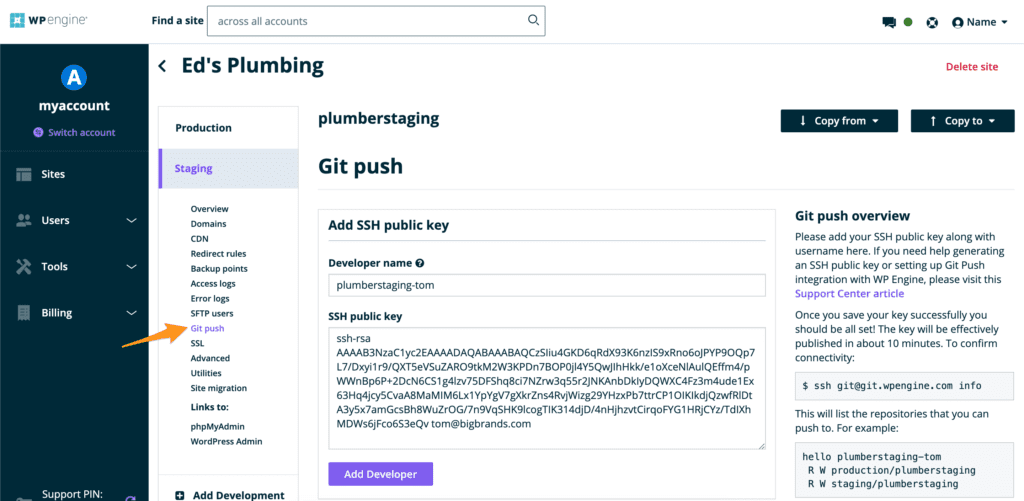Github Ssh Generate New Key
Hi there! This post will be pretty straightforward and will cover Windows, Mac, and Linux, so if you don’t know how to do it already, read on.
Generate rsa key pair online. I believe the problem is that a callback doesn't generally give you the ability to send information in, only receive information back. As some of the other posters have mentioned, you might consider altering the source code of the actual key generation routine, and compiling your own version. I remember the third argument to RSAgeneratekey is a callback function used for displaying progress - is there any way that callback could return a value that means 'abort the operation and return'?Running the function in another thread and then terminating the thread is not an option.
- Follow the instructions to generate your SSH key pair. Adding your SSH public key to GitLab To add the SSH public key to GitLab, see Adding an SSH key to your GitLab account. Note: Once you add a key.
- $ ssh-add /.ssh/idrsa. Step 3.1: Add the SSH key to your GIT account. Get your public key $ cat /.ssh/idrsa.pub. Go to your GIT project - Settings - SSH keys. Then past the content of your public key in SSH keys. Step 3.2: Force SSH Client To Use Given Private Key. This is an alternative solution when you can't set keys on your Git.
- Oct 13, 2019 Generating a new ssh-key. Open Terminal. Paste the text below, substituting in your GitHub email address. Ssh-keygen -t rsa -b 4096 -C 'youremail@example.com' This creates a new ssh key, using the provided email as a label. Generating public/private rsa key pair.
- Generate a new SSH key.Add to the ssh-agent Step 1: Open Terminal. Step 2: Type this below, using your GitHub's account email. Step 3: It will show up this text and you can hit Enter. Step 4: In this section you can hit Enter too or type secure passphrase ( more about passphrase ).
- Before adding a new SSH key to your GitHub Enterprise account, you should have: Checked for existing SSH keys; Generated a new SSH key and added it to the ssh-agent; After adding a new SSH key to your GitHub Enterprise account, you can reconfigure any local repositories to use SSH. For more information, see 'Switching remote URLs from HTTPS to.
Windows
Just follow these 5 steps:
- Go to this address, and download Git for Windows, after the download install it with default settings
- Open Git Bash that you just installed (Start->All Programs->Git->Git Bash)
- Type in the following: ssh-keygen -t rsa (when prompted, enter password, key name can stay the same)
- Open file your_home_directory/.ssh/id_rsa.pub with your favorite text editor, and copy contents to your Git repository’s keys field (GitHub, beanstalk, or any other repository provider), under your account.
- Be sure that you don’t copy any whitespace while copying public key’s content (id_rsa.pub)
Note: your_home_directory is either C:Usersyour_username (on Windows Vista / 7 / 8 / 10), or C:Documents and Settingsyour_username (on Windows XP)
The cryptography behind SSH keys ensures that no one can reverse engineer your private key from the public one. Generating an SSH key pair. The first step in using SSH authorization with GitHub is to generate your own key pair. You might already have an SSH key pair on your machine.
Mac
Follow these 5 steps:
- Start the terminal
- Navigate to your home directory by typing: cd ~/
- Execute the following command: ssh-keygen -t rsa (when prompted, enter password, key name can stay the same)
- Open the file you’ve just created ~/.ssh/id_rsa.pub with your favorite text editor, and copy contents to your Git repository’s keys field (GitHub, beanstalk, or any other repository provider), under your account.
- Be sure that you don’t copy any whitespace while copying public key’s content (id_rsa.pub)
Linux (Ubuntu)
Follow these 5 steps:

Create Ssh Key For Github
- Open console
- cd ~
- ssh-keygen -t rsa (when prompted, enter password, key name can stay the same)
- open file /home/your_username/.ssh/id_rsa.pub with your favorite text editor, and copy contents to your Git repository’s keys field (GitHub, beanstalk, or any other repository provider), under your account.
- Be sure that you don’t copy any whitespace while copying public key’s content (id_rsa.pub)
Additional info
When you create private/public SSH keys on your machine (that’s what you did in the above steps), it’s not enough. You need to give your public key to the repository in order to pair the Git server with your local machine (that’d be steps 4. and 5. above).
Most of the popular repositories will give you web interface access to the application, and here’s how it looks like on Github:
After this step, you’re ready to start using Git.
Conclusion

I hope this wasn’t too complicated to follow, and also I hope it was helpful to someone!
Cheers!
____________________________________________________________________________________________
Generate a 128 bit key encoded to base64. Understand that English isn't everyone's first language so be lenient of badspelling and grammar.
Github Ssh Generate New Key Code
Note! This article was revised on Jul 26, 2019. The original article was posted in 2011 by Mladen Lotar.